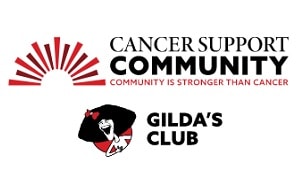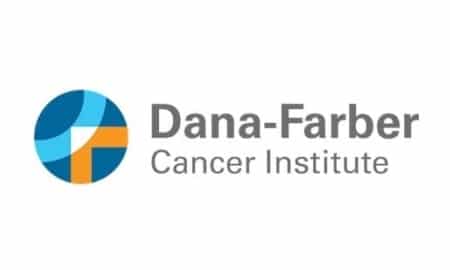Understanding caregiving
Caregivers help to meet the daily physical, practical, and emotional needs of people with cancer. Here we focus on informal or unpaid caregivers—family members, partners, and friends—who may generally be called family caregivers. Many family caregivers live with their loved ones with cancer, but some cancer caregivers may provide long-distance care, providing support by phone and email and/or arranging help from friends and family who do live nearby.
Common caregiving tasks
As a caregiver, you may take on a complex combination of tasks providing medical, physical, communication, practical, and emotional support. Your specific tasks will depend on your loved one’s condition, needs, and circumstances. Your age and relationship with your loved one play a part. As a caregiver, your tasks and roles may change as your loved one’s needs and condition change.
Caregiving tasks may include these:
Medical support
- Track and/or give medication
- Track and help manage symptoms and side effects
- Monitor your loved one’s condition and decide when to seek medical help
- Accompany your loved one to medical appointments
- Provide proper medical and physical care
- Keep records, including keeping track of items such as these:
- Medical appointments
- Test results
- Medication names and dosages
- Treatment plans
- Questions
- Names and contact information of resources
- If your loved one grants authority, speak for them if they are unable to direct their own medical care. This may include decisions at the end of life.
Physical support
- Bathing, grooming, and dressing
- Eating
- Toileting
- Walking/managing mobility
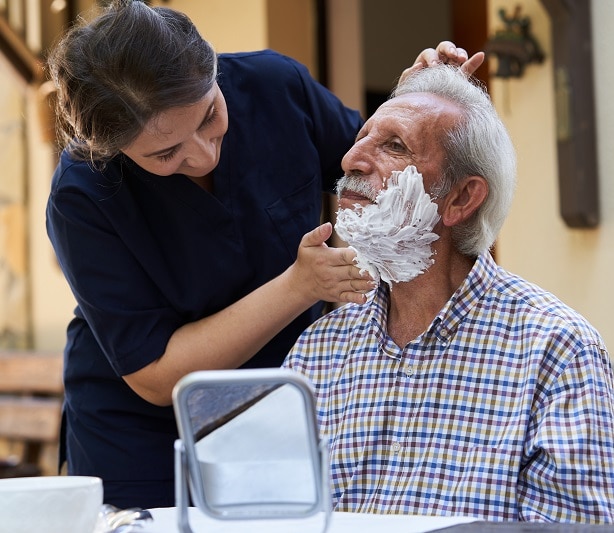
Practical support
- Shopping
- Driving or arranging transportation
- Caring for children and pets as needed
- Cooking
- Cleaning
- Laundry and other chores
- Managing insurance, financial, and legal issues
Communication support
- Coordinate with medical providers, agencies, and health professionals, including these tasks:
- Relaying information on your loved one’s condition, symptoms, and progress
- Obtaining information needed to understand and support your loved one’s ongoing medical needs
- Managing medical and insurance paperwork
- Advocating on the behalf of your loved one
- Making appointments
- Update family members, friends, and others about your loved one’s condition
- Coordinate with others who are sharing caregiving responsibilities
Emotional support
- Be available to listen to what your loved one shares about their experiences, needs, and preferences, clarify anything that is unclear, and offer understanding and support without judgment or trying to “fix” anything
- Look for signs that your loved one needs help coping with difficult emotions and, if necessary, ask their healthcare team about resources that can help
Family caregivers in the United States spend an average of about 30 hours per week caring for their loved ones with cancer. Most interact with medical providers, agencies, and care professionals on behalf of their loved ones, and about two-thirds advocate on their behalf.1National Alliance for Caregiving. Research Report: Cancer Caregiving in the US. June 2016.
Each caregiver’s path is as unique as the individual circumstances faced by the person with cancer. Some caregivers share the responsibility for tasks with other caregivers. For example, friends or members of a club or church might take turns bringing food or caring for children.

You can find further details on caregiving tasks from the American Cancer Society.
Rewards of caregiving: finding meaning, deeper connections, personal growth
Many caregivers find satisfaction, a sense of accomplishment, and even pride in knowing that they are doing as much as they can for their loved ones with cancer, helping improve their well-being and quality of life. For some, the caregiving process deepens the relationship with their loved one with cancer. Working through new situations and challenges together in a respectful way can boost collaboration and communication skills. It can allow both the caregiver and the person with cancer to see and appreciate each other’s qualities in new ways and enhance understanding, empathy, and affection.
Caregiving may also provide the opportunity to build new relationships or to deepen existing ones with family members, friends, colleagues, community members, and others. As a caregiver, you may find that through your efforts, a community of people comes together and grows in strength and closeness as it works to support you and your loved one with cancer.
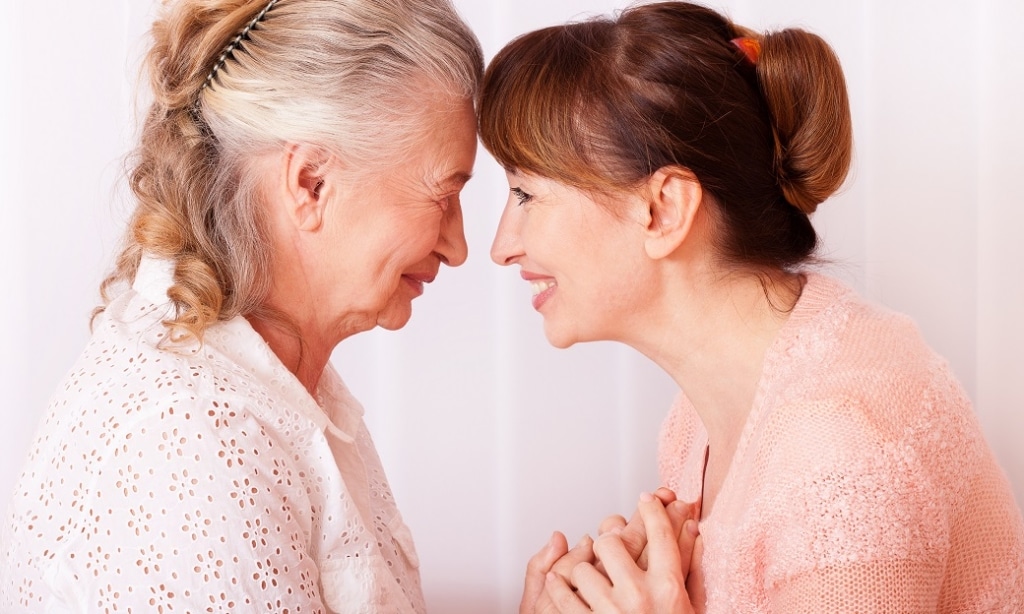
You may also find that caregiving nurtures self-reflection and personal growth. You may learn new skills, both personal and practical, and become aware of strengths and weaknesses that you had not noticed or considered before.
Perhaps you will learn what motivates you, what stresses you, and what best supports both your body and your spirit during a phase of life that may feel very challenging. You might also find yourself re-examining your own sense of purpose and goals in life as you focus your time and energy around your caregiving.
Many of us find that we grow the most during the hardest times of our lives. During such times we often push ourselves to change, perhaps achieving things we had previously thought were impossible. We may emerge from our periods of difficulty with new understanding, enhanced compassion and connection to others who are also struggling, and deeper humility. Some of us may also gain confidence from observing our own capacity to change, expand our minds and hearts, and be with others and the world in new ways.
Challenges of caregiving: stress, complex and changing roles and relationships
Feeling overwhelmed, burdened, or even trapped while caregiving is normal. If you experience emotional strain, you are not alone: more than 40% of caregivers of people with cancer report depression, more than 45% report anxiety,2Geng HM, Chuang DM et al. Prevalence and determinants of depression in caregivers of cancer patients: a systematic review and meta-analysis. Medicine (Baltimore). 2018 Sep;97(39):e11863. and 50% report being highly stressed.3National Alliance for Caregiving. Research Report: Cancer Caregiving in the US. June 2016. You may also experience grief, frustration or anger, feelings of isolation, guilt, or hopelessness.
Financial stress, balancing caregiving with your job, and having less time for other loved ones may weigh on you. If you have children or pets, caring for them in addition to your loved one with cancer may be difficult or impossible without help. You may feel you don’t have enough time for yourself, not only to work or take care of essential tasks, but to take breaks to exercise, eat well, be in nature, see friends, or do other things that nurture you. Chronic stress may trigger physical symptoms such as fatigue, headaches, and sleep disruption, and you may find that you get sick more often than usual.
Many caregivers and their loved ones experience more stress than usual in their relationships. Handling changes in roles and routines, trying to minimize the suffering experienced by your loved one, and effectively navigating decisions requires flexibility, mental energy, clear and respectful communication, and deep empathy on both sides, all of which can be difficult to sustain. Some caregivers may find that their connection with their loved one becomes strained.
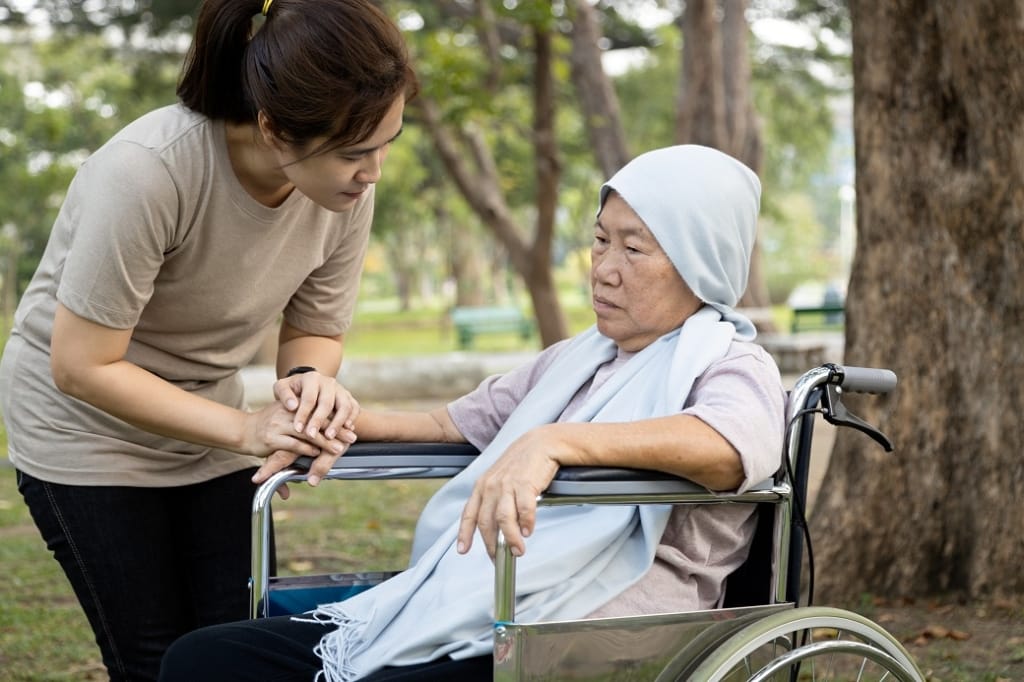
Conflicts sometimes arise between family members or others working to provide support, which can cause additional emotional stress. Caregivers who are children or young adults may find it especially difficult to balance caregiving with other responsibilities and opportunities.
Some caregivers may find themselves taking on the caregiver role even though they have little or no desire or ability to do so. They may feel pressure from family members, friends, or their loved one’s care teams to provide care and feel they have no choice. If you feel uncomfortable about being a caregiver and would like alternatives to be considered, decide on your limits and communicate them as soon as you can. Sharing caregiving duties with someone else may be possible, or finding paid or volunteer help as needed. You may also consider palliative or hospice care if appropriate.
Learn more
References

